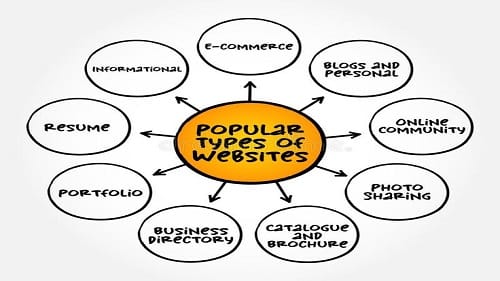In simple terms, a website is a collection of web pages that represent a person, business, or organization online. But in 2025, a website is much more than just an online presence. It’s a powerful tool that drives business growth, builds credibility, and connects you with customers worldwide. Understanding what is website and how it functions is the first step toward using its full potential. With a strong website, businesses can showcase products and services, engage audiences, generate leads, and increase sales.
Think of a website as your digital office. It’s where people first visit to find out about your company. In 2025, when nearly every customer searches online before making a purchase, having a website isn’t just optional, it’s essential. But what is website really and how does it help businesses grow? In this guide, you’ll discover the basics of websites and the key benefits they offer to help your business thrive in today’s digital world.
What is Website? A Simple Definition for 2025
A website is a digital platform made up of web pages that people can access through the internet. It serves as your business’s online address where potential customers learn about your brand, explore your products or services, and connect with you. It’s your brand’s voice, your salesperson, your customer service desk, and your lead generator, all in one place.
Modern websites are more than static pages. They are mobile-friendly, engaging, and created to keep users interested. Whether it’s an online store, a portfolio, or a company profile, a website helps build trust, attract traffic from search engines, and convert visitors into customers. When someone types your website address into their browser, they should find valuable information about your business, products, services, and ways to connect with you.
In simple words:
A website is your business’s home on the internet where customers learn about you, trust you, and engage with your brand.
Key Components That Make Up a Website
To understand what makes a website work, let’s break down its essential parts. It’s important to know the key components that make a website functional and effective. A website isn’t just a collection of pages; it’s a combination of various elements working together to deliver information and engage users.
Domain Name and Hosting
Domain Name: This is the web address that users enter into their browsers to access your website, such as www.yourbrand.com.
Hosting: This is where your website lives. Hosting providers a service that stores your website’s files and make them accessible on the internet to visitors worldwide.

Website Design and Layout
This includes the visual look of your website fonts, colors, images, and layout. Menus and links help visitors easily find the information they’re looking for. Great design makes it easy for visitors to navigate your website and find what they need. A clean, professional design creates a positive user experience and reflects your brand identity.
Content Management System (CMS)
Most businesses use CMS platforms like WordPress make is easy to build, update and manage your website content without needing coding skills. The actual text, images, videos, and graphics that tell your story, showcase your products, and communicate with your audience.
Security Features and Analytics
SSL certificates (HTTPS), firewalls, and regular updates keep your website secure. Google Analytics and other tracking tools help measure visitor behavior and improve your website’s performance.
The Evolution of Business Websites: From Static Pages to Interactive Platforms
Understanding what is website today means recognizing how far websites have changed. In the early days, a website was simply a static page displaying basic information. Fast forward to 2025, and websites have transformed into dynamic, interactive platforms that actively engage users and support business growth. Modern business websites now offer a wide range of features, allowing visitors to:
- Book appointments – Directly from the website, making it easy for customers to schedule meetings or services without phone calls.
- Make purchases – Through secure ecommerce platforms, turning your website into a 24/7 sales channel.
- Chat with AI-powered bots – That answer questions instantly, improve customer service, and guide visitors through your products or services.
- Watch videos and tutorials – That educate and inform, improving the user experience and building trust in your brand.
- Submit inquiries in real-time – Allowing potential customers to get quick responses and support.
Today’s websites are interactive business tool designed to deliver seamless customer experiences, drive conversions, and increase business growth.
Why Every Business Needs a Website in 2025
Asking what is website means understanding that it’s the digital foundation of every successful business. A website is no longer a luxury or a side project, it’s an essential part of how companies reach customers, build credibility, and grow revenue. Today’s consumers search online before making decisions. If your company doesn’t have a website, it could big lose the benefit of those possibilities. A well-designed website allows you to showcase your products or services, share your brand story, and make it easy for people to contact or buy from you, all in one place.
Whether you’re a small startup or a developed company, having a strong website in 2025 means being accessible 24/7, ranking on search engines, and staying competitive in a fast-paced digital world. That’s why every business must understand what is website and invest in creating one that truly drives results. Are you still unsure about the value of a website for your business? Here are the key reasons:
Building Brand Awareness
When asking what is website, one of the key answers lies in its power to build brand awareness. A website acts as your business’s digital showroom, helping people discover who you are and what you offer. Your company’s website frequently functions as the first the online world impression. A professional-looking website builds trust and credibility.
Consumers turn to search engines and social media to learn about brands before making decisions. A professional website allows you to showcase your brand story, values, products, and services in a way that reflects your identity. With consistent branding, engaging content, and SEO optimization, your website helps your business reach a wider audience and stay memorable in a crowded online marketplace. Ultimately, what is website? It’s your most powerful tool for developing a recognizable, trustworthy brand presence online.
Generating New Leads and Sales
When asking what is website, one of the most valuable answers is its role in generating new leads and driving sales. A website is not just an informational tool, it’s a powerful sales engine working 24/7 for your business.
With features like contact forms, lead magnets, live chat, and conversion-optimized landing pages. A well-built website helps capture visitor interest and turn it into action. Whether you’re offering a product, service, or consultation, your website guides users through the buying journey from awareness to decision-making. So, what is website? It’s your most effective digital asset for attracting prospects, nurturing trust, and converting visitors into loyal customers.
Improving Customer Experience and Support
24/7 availability means your website works even when your office is closed, answering common questions and providing support. Understanding what is website means recognizing its role in improving customer experience and support. A modern website is more than a digital brochure. It’s a smart, interactive platform that helps businesses serve their customers better.
With features like live chat, AI-powered chatbots, FAQs, support ticket systems, and resource hubs, websites allow users to get answers instantly, anytime. Mobile-friendly design, fast loading speeds, and simple navigation also ensure visitors enjoy a smooth and satisfying experience. So, what is website today? It’s your front line of customer service, a powerful tool that builds trust, solves problems, and keeps your audience engaged around the clock.
Expanding Market Reach beyond Physical Boundaries
In today’s global digital economy, understanding what is website includes realizing its power to break geographical barriers. A website allows your business to reach customers far beyond your local area, across cities, countries, and even continents.
By being online 24/7, your website gives people from anywhere in the world access to your products, services, and brand story. Whether you’re a small startup or a growing enterprise, a well-optimized website enables you to tap into new markets, attract international customers, and scale without limits. So, what is website? It’s your gateway to a global audience, helping you expand your market reach and grow your business beyond physical boundaries.
How a Website Helps You Rank on Google and Attract Traffic
Most people search for businesses on Google first. Your website is what gets you found. When exploring what is website, it’s essential to understand its role in helping your business rank on Google and attract traffic. A website serves as your digital platform where search engines like Google find and display your content to users searching for relevant products or services.
Through SEO (Search Engine Optimization) techniques such as keyword-rich content, optimized images, fast loading times, and mobile-friendly design, your website becomes more visible in search results. People will click on and visit your website more frequently if it ranks higher. So, what is website? It’s not just a place to showcase your business, it’s your main key to drive organic traffic from Google, reach your target audience, and grow your business online.
SEO Basics Every Business Website Needs
SEO (Search Engine Optimization) helps your website appear in search results. This involves:
- Using relevant keywords like “what is website”
- Optimizing titles and meta descriptions
- Building high-quality backlinks
- Publishing valuable content regularly
Mobile Optimization and User Experience
With more than 70% of users browsing on mobile, your website must look and function great on smartphones and tablets. A website that is mobile-friendly improves user experience and boosts Google ranks.

Common Types of Business Websites in 2025
When understanding what is website, it’s important to know that websites come in many forms, each designed to meet specific business goals. In 2025, businesses build websites that do more than just display information, they drive engagement, sales, and growth. Different businesses need different types of websites. Here are some of the most popular website types you’ll find in 2025:
E-commerce Websites
Perfect for businesses selling products and services directly online. E-commerce websites allow customers to browse products, add them to a cart, offering secure payment gateways and easy shopping experiences, all from the comfort of their home. Popular platforms: WooCommerce (on WordPress), Shopify, BigCommerce.
Service-Based Company Websites
Promote services such as consulting, repairs, or coaching, often including booking forms and lead generation tools. These websites showcase services, pricing, and success stories. They also make it easy for customers to request quotes or schedule appointments.
Portfolio and Personal Branding Websites
For creatives like designers, photographers, and freelancers. Portfolio websites showcase your work and help attract new clients.
Informational and Blogging Websites
For share industry insights, news, educators, nonprofits, and thought leaders. Blogging websites provide helpful content to educate your audience and improve search rankings.
Website Features That Drive Growth in 2025
When people ask what is website, the answer goes far beyond just being an online presence. A modern website isn’t just about looking pretty, but also a growth engine packed with smart features designed to engage visitors and drive results. These features help your website generate leads and sales.
Chatbots and AI Integrations
Today’s websites use AI-powered chatbots to provide instant customer support, answer common questions, and guide visitors toward making a purchase, improving customer experience and increasing conversions. Smart chatbots answer visitor questions, qualify leads, and book appointments 24/7.
Social Media Integrations
Websites now seamlessly connect with social media platforms, allowing visitors to share content, follow your brand, and engage with your business across channels. This integration extends your reach and builds community around your brand. Connect your website with Facebook, Instagram, LinkedIn, and other social platforms to drive traffic and grow your audience.
Conversion-Focused Landing Pages
High-converting landing pages are designed to capture leads or drive sales. These pages focus on clear calls-to-action, effective offers, and optimized layouts that guide visitors toward taking the next step. Special pages designed to capture leads from marketing campaigns. These pages have a single purpose—whether that’s booking a consultation or downloading a free guide.

DIY vs. Professional Website Development: What Should You Choose?
When exploring what is website, it’s important to understand the difference between building one yourself and hiring professionals.
DIY Website Builders
DIY website builders may look convenient and affordable, but they often come with disadvantages in term of scalability, performance, and design.
- Pros: Lower upfront cost, beginner-friendly.
- Cons: Limited customization, lower SEO performance, and not ideal for serious business growth.
Professional WordPress Website Development
Professional website development ensures your website is fast, secure, mobile-friendly, and customized to your business goals. Experts handle everything from custom design and SEO optimization to functionality and long-term support.
- Pros: Fully customizable, SEO-optimized, scalable, and built for growth.
- Cons: Higher initial investment, but better long-term ROI.
So, what is website in 2025? It’s a strategic business asset and to get it right, choosing professional website development over DIY is often the smarter investment for long-term success. If you’re serious about growing your business, professional website development is worth it.
Future Trends: How Websites Will Evolve Beyond 2025
Technology never stands still. As we look beyond 2025, the answer to what is website continues to change with cutting-edge technology shaping how users interact online. Websites are becoming more intelligent, engaging, and customized than in earlier days. Here are key trends driving the future of websites:
- Voice Search Optimization: With voice assistants becoming more common, websites will be optimized for conversational queries, making content easier to access through spoken commands. More users will find your website by asking Siri, Alexa, or Google Assistant.
- Augmented Reality (AR): AR will transform how users experience products online, especially in retail, real estate, and education. Users will be able to “try before they buy” through interactive visuals. E-commerce websites will let you preview products in your home.
- Personalization: Websites will deliver highly customized experiences based on your browsing behavior, preferences, and location, showing the right content to the right person at the right time.
- AI-Generated Content: Automated tools will create blog posts and product descriptions, keeping websites fresh and relevant with minimal manual effort faster than ever.
In short, It’s an intelligent, interactive platform designed to adapt to users’ needs and a critical part of every business’s digital future.
FAQs
Q- What is website in simple words?
A website is your business’s online home where customers learn about your products, services, and contact details.
Q- How does a website help my business grow?
A website helps your business grow by attracting more visitors through search engines, converting them into leads, and building brand trust.
Q- Can a small business afford a professional website?
Yes, with affordable WordPress development and hosting starting from ₹15,000–₹30,000, small businesses can easily get started.
Q- Is it worth investing in website SEO?
Absolutely. SEO helps your website rank on Google, bringing in free, targeted traffic that turns into sales.
Q- Should I build my own website or hire a developer?
If you want a serious online presence, hiring a professional developer is the better choice for scalability, security, and results.
Conclusion:
If your business doesn’t have a website, you’re invisible to most potential customers. However, having a website just is insufficient; it must be optimized for growth, strategic, and attractive. By understanding what is website and how it works, you can turn your online presence into your business’s most powerful growth engine.
If you enjoyed this article about what is website, share your thoughts in the comments below! Please visit www.uniqueincs.com for more valuable content and claim your free e-book. Plus, explore discounted Digital Marketing Products to boost your business!
Improve your digital presence with an innovative website design that seamlessly integrates style and utility. Connect with www.uniquewebonline.com, using the most current trends and technologies to create visually pleasing and user-centric websites customized to increase your brand. Always prepared to captivate your audience and make a lasting impression, Unique Web Online invites you to create a digital experience that distinguishes you. Explore our portfolio and get started on the path to a striking, responsive, and effective website today.

